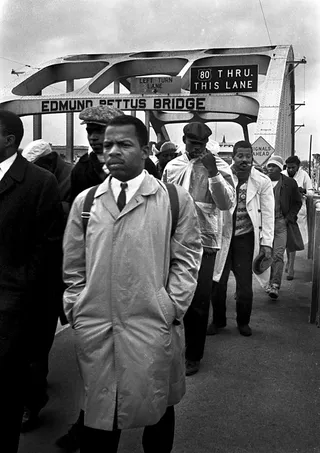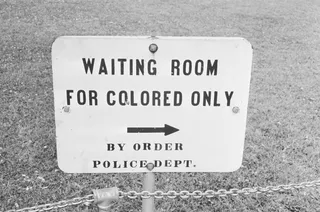The Impact of the Civil Rights Act of 1964
A look at how the act inspired social and political change.

1 / 21
The Impact of the Civil Rights Act of 1964

2 / 21
The More Things Change… - The signing of the Civil Rights Act of 1964 was historic event but by no means a panacea. Blacks in the South still suffered under the hand of Jim Crow. They didn't fare much better in the North, where inadequate housing and education prevented them from enjoying the American Dream. -- By Joyce Jones (Photo: Cecil Stoughton/ White House Press Office)

3 / 21
A Path Forward - The new law did give African-Americans a legal right to confront inequities and injustice. It also paved the way for the Voting Rights Act of 1965, the Fair Housing Act of 1968 and affirmative action. Here are the law's landmark provisions and some of the ongoing fights for civil rights. (Photo: OFF/AFP/Getty Images)

4 / 21
Voting Rights - Title I barred unequal application of voter registration requirements but did not ban literacy tests sometimes used to disqualify African-American and poor white voters. (Photo: Matt Stamey/Staff photographer/Gainesville Sun /Landov)
Photo By Photo: Matt Stamey/Staff photographer/Gainesville Sun /Landov/ Matt Stamey/Staff photographer/Gainesville Sun /Landov

5 / 21
Bloody Sunday - On March 7, 1965, hundreds of civil rights activists attempting to cross the Edmund Pettus Bridge from Selma to Montgomery, Alabama, in a march for voting rights, were violently attacked by state troopers. (Photo: Birmingham News /Landov)
Photo By Birmingham News /Landov
ADVERTISEMENT

6 / 21
Undeterred - The Bloody Sunday marchers, joined by thousands of more people, on March 21 successfully completed a third attempt to cross the Pettus Bridge. (Photo: AFP/Getty Images)

7 / 21
Voting Rights Act of 1965 - On Aug. 6, President Lyndon B. Johnson signed the Voting Rights Act into law, which prohibited literacy tests and other efforts to disenfranchise Black voters. (Photo: Keystone/Getty Images)

8 / 21
Public Accommodations - Title II outlawed discrimination in hotels, motels, restaurants, theaters and all other public accommodations engaged in interstate commerce. Private clubs were exempted but "private" was not defined in the law. (Photo: Hulton Archive/Getty Images)

9 / 21
Desegregation of Public Facilities - Title III permitted Justice Department lawsuits to secure desegregation of certain public facilities.(Photo: William Lovelace/Express/Hulton Archive/Getty Images)
Photo By Photo: William Lovelace/Express/Hulton Archive/Getty Images

10 / 21
Desegregation of Public Schools - Title IV encouraged the desegregation of public schools and authorized the U. S. Attorney General to file suits to force desegregation, but did not authorize busing as a means to overcome segregation based on residence.(Photo: Dave Mathias/The Denver Post via Getty Images)
ADVERTISEMENT

11 / 21
Civil Rights Commission - Title V addressed procedures for the commission, broadened its duties, and extended its life through January 1968. Here, Frankie Muse Freeman is sworn in as the first woman member of the new U.S. Commission on Civil Rights on Oct. 6, 1964. (photo: National Archive/Newsmakers/GettyImages)

12 / 21
Nondiscrimination in Federally Assisted Programs - Title VI authorized but did not require withdrawal of federal funds from programs that practiced discrimination.(Photo: Mark Scott/Getty Images)

13 / 21
Equal Employment Opportunity - Title VII outlawed discrimination in employment in any business with 25 or more employees and created an Equal Employment Opportunities Commission to review complaints, although it lacked meaningful enforcement powers. (Photo: Ariel Skelley/Getty Images)

14 / 21
Registration and Voting Statistics - Title VIII directed the Census Bureau to collect registration and voting statistics based on race, color and national origin but did not mandate that individuals had to disclose such information. (Photo: Alex Wong/Getty Images)

15 / 21
Intervention and Removal of Cases - Title IX made reviewable in high federal courts the action of federal district courts in remanding a civil rights case to state court and authorized the Attorney General to intervene in certain private suits. (Photo: Getty Images)
ADVERTISEMENT

16 / 21
Community Relations Service - Title X created the Community Relations Service to aid communities in resolving disputes relating to discriminatory practices based on race, color, or national origin.(Photos from Left: United States Government, Landov)

17 / 21
Loving v. Virginia - On June 12, 1967, the U.S. Supreme Court rules that laws against interracial marriage are unconstitutional. (Photo: dpa /Landov)

18 / 21
Political Victory - On Nov. 7, 1967, Carl Stokes of Cleveland, Ohio, becomes the first African-American elected mayor of a major American city. (Photo: R. Gates/Getty Images)

19 / 21
Thurgood Marshall - On Sept. 1, 1967, Thurgood Marshall becomes the first African-American to serve on the U.S, Supreme Court.(Photo: Stock Montage/Getty Images)

20 / 21
Sanitation Workers Strike - On Feb. 11, 1968, Black sanitation workers in Memphis, Tennessee, go on a strike against poor treatment and dangerous working conditions that lasts until April 16. With support from Martin Luther King Jr. they win concessions on wages and union recognition.(Photo: Barney Sellers/Commercial Appeal /Landov)
